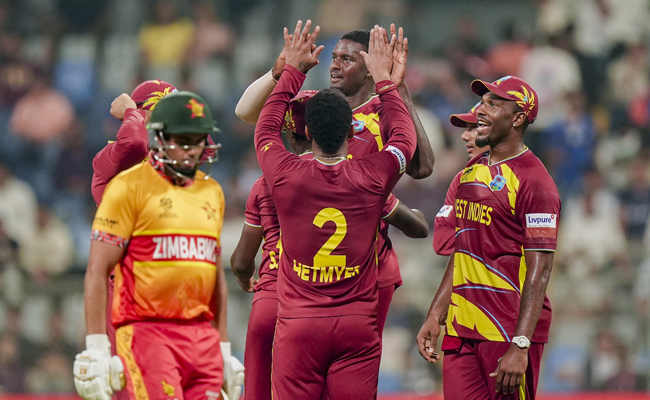New Delhi, Oct 25: Delhi speedster Harshit Rana and Andhra seam bowling all-rounder Nitish Kumar Reddy have earned their maiden call-up in the 18-member Indian team led by Rohit Sharma for the upcoming five-Test series against Australia for the Border-Gavaskar Trophy.
India will look to defend the trophy during the rubber that starts from November 22 at Perth.
However, pacer Mohammed Shami is not part of the squad while left-arm wrist spinner Kuldeep Yadav has been advised long-term rehabilitation for his groin injury.
From the squad that was picked for the New Zealand series, Axar Patel has been dropped as off-spinner Washington Sundar, who has 11 wickets in his kitty so far in the ongoing Test in Pune, preferred over the Gujarat left-arm spinner.
Bengal man Abhimanyu Easwaran has entered the squad as reserve opener after four back-to-back hundreds in Duleep, Irani and Ranji Trophy matches.
The cover is because of the possibility of Rohit skipping one of the earlier Test matches due to personal reasons.
KL Rahul and Sarfaraz Khan make up for the middle-order with Rishabh Pant and Dhruv Jurel being the two wicket-keepers.
Prasidh Krishna, the lanky pacer who made his debut in South Africa last year, is back in the squad after a long injury lay-off.
However, the story of this Indian team selection is hulk-like Delhi speedster Harshit, who is only nine First-Class matches old and has taken 36 wickets.
But with a stellar IPL season under Gautam Gambhir at KKR, Rana has come quickly into the national reckoning and has been part of the squads in all formats, although he is yet to make his debut.
He bowls consistently in the 140-click range and has a good short ball apart from being able to nail his yorkers perfectly.
“Harshit Rana has been completely Gautam Gambhir's choice. He has been pushing his case for the longest time since the start of the Sri Lanka tour.
“He was also kept as a reserve bowler. Since he is younger and quicker than both Navdeep Saini and Mukesh Kumar, he has pipped them to the final squad,” a BCCI source told PTI on conditions of anonymity.
As far as Nitish Reddy is concerned, he has one century and two five-wicket hauls in his 21 First-Class games and he was more of a forced choice as the seam bowling all-rounder cupboard is bare.
“Hardik Pandya has stopped playing red-ball cricket and Shivam Dube's (he is injured) bowling isn't up to the mark.
“Nitish is a work in progress but if India are to bring in balance, they need their fourth seamer to be an all-rounder. Hence Nitish is a desperate choice going by his IPL and Bangladesh series performance,” the source said.
It is understood that it won't be surprising if Washington gets ahead in pecking order in Australia for the second spinner's slot (first spinner would be Ravindra Jadeja) over Ravichandran Ashwin due to his superior batting skills which has already been tested in Australia during the last tour.
Among batsmen, Easwaran was rewarded for his four hundreds on the trot but he could also be a stonewaller like Cheteshwar Pujara if needed be during any part of the series.
Axar had to miss out because he would have been one spinner too many with Jadeja already in the side.
Mayank Yadav injured again
India's fastest bowler Mayank Yadav is injured again after an impressive international debut against Bangladesh as he missed out on a tour of South Africa for the four T20Is.
KKR batting all-rounder Ramandeep Singh and Karnataka speedster Vyshak Vijaykumar are the new entrants in the T20I set-up.
Dube (back injury) and Riyan Parag (shoulder injury) are back at the Center of Excellence for extensive rehabilitation.
India's squad for the Border-Gavaskar Trophy: Rohit Sharma (C), Jasprit Bumrah (VC), Yashasvi Jaiswal, Abhimanyu Easwaran, Shubman Gill, Virat Kohli, KL Rahul, Rishabh Pant (WK), Sarfaraz Khan, Dhruv Jurel (WK), R Ashwin, R Jadeja, Mohd. Siraj, Akash Deep, Prasidh Krishna, Harshit Rana, Nitish Kumar Reddy, Washington Sundar.
Reserves: Mukesh Kumar, Navdeep Saini, Khaleel Ahmed.
India's squad for 4 T20Is against South Africa: Suryakumar Yadav (C), Abhishek Sharma, Sanju Samson (WK), Rinku Singh, Tilak Varma, Jitesh Sharma (WK), Hardik Pandya, Axar Patel, Ramandeep Singh, Varun Chakaravarthy, Ravi Bishnoi, Arshdeep Singh, Vijaykumar Vyshak, Avesh Khan, Yash Dayal.
Let the Truth be known. If you read VB and like VB, please be a VB Supporter and Help us deliver the Truth to one and all.
Shimla (PTI): A woman has been arrested from Punjab for allegedly duping another woman of Rs 25 lakhs by promising her to arrange a visa for Canada, police said on Monday.
The accused has been identified as Manju Kumari, a resident of Punjab.
Senior Superintendent of Police SSP Shimla Gaurav Singh said that Manju had contacted the woman several months ago and had promised her to arrange a visa for Canada.
"After this, she asked for money for the same from the victim, which she transferred to her on multiple occasions. However, as time went by, Manju started to make various excuses and ignored her calls," the SSP said.
Upon suspecting being defrauded, the victim's brother registered a complaint, and a case was registered under sections 318 (4) (cheating), 61(2) (criminal conspiracy) and 352 (2) (intentional insults designed to provoke a breach of peace) of Bharatiya Nyaya Sanhita (BNS), the SSP said.
"Police teams were sent to Haryana and Punjab, but she kept evading arrest as she kept changing her locations as well as her mobile numbers. However, the police teams successfully arrested her on Sunday from a flat located in Kharar in Punjab," he said.
Further investigation into the matter is underway, and the defrauded money is also being recovered, he added.





